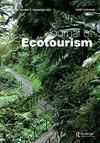An ecotourist by whose standards? Developing and testing the Ecotourist Identification Scale (EIS)
IF 2.4
Q2 HOSPITALITY, LEISURE, SPORT & TOURISM
引用次数: 4
Abstract
ABSTRACT Despite numerous attempts at operationalising ecotourism, none have explicitly incorporated the three tenets of ecotourism (i.e. nature, education, and sustainability) into scale development with the purpose of identifying ecotourists from non-ecotourists. Therefore, we used a combination of Churchill and Rossiter’s scale development frameworks to create the Ecotourist Identification Scale (EIS) as a tool for identifying ecotourists based on these three criteria. We split a sample of 786 U.S. travellers in half to perform a Principal Components Analysis for scale purification on one half followed by a Confirmatory Factor Analysis on the other. Results of the Confirmatory Factor Analysis indicated strong construct reliability for each component of the EIS based on factor loadings above 0.50, reliability coefficients exceeding 0.70, and Average Variance Explained above 50%. Furthermore, we employed Structural Equation Modeling to explore which aspects of ecotourism’s three tenets influence intention to engage in ecotourism by testing the relationship between EIS scale components and ecotourism intention. Results indicate interest in nature and environmental sustainability are significantly related to ecotourism intention while interest in education, socio-cultural sustainability, and economic sustainability are not, indicating discrepancies between the academic definition of ecotourism and the factors driving tourists to engage in ecotourism.生态旅游者的标准是什么?生态旅游者识别量表(EIS)的开发与测试
摘要尽管在生态旅游运营方面进行了多次尝试,但没有一次明确将生态旅游的三大原则(即自然、教育和可持续性)纳入规模发展,以区分生态旅游者和非生态旅游者。因此,我们结合Churchill和Rossiter的规模发展框架创建了生态旅游者识别量表(EIS),作为基于这三个标准识别生态旅游者的工具。我们将786名美国旅行者的样本一分为二,对其中一半进行主要成分分析以进行规模纯化,然后对另一半进行验证性因素分析。验证性因子分析的结果表明,基于因子负荷超过0.50、可靠性系数超过0.70和解释的平均方差超过50%,EIS的每个组成部分都具有很强的结构可靠性。此外,我们采用结构方程模型,通过测试EIS量表组成部分与生态旅游意向之间的关系,探讨生态旅游三大原则的哪些方面影响参与生态旅游的意向。研究结果表明,对自然和环境可持续性的兴趣与生态旅游意向显著相关,而对教育、社会文化可持续性和经济可持续性的关注则不然,这表明生态旅游的学术定义与推动游客参与生态旅游的因素之间存在差异。
本文章由计算机程序翻译,如有差异,请以英文原文为准。
求助全文
约1分钟内获得全文
求助全文
来源期刊

Journal of Ecotourism
Social Sciences-Geography, Planning and Development
CiteScore
6.40
自引率
12.50%
发文量
32
期刊介绍:
The Journal of Ecotourism seeks to advance the field by examining the social, economic, and ecological aspects of ecotourism at a number of scales, and including regions from around the world. Journal of Ecotourism welcomes conceptual, theoretical, and empirical research, particularly where it contributes to the dissemination of new ideas and models of ecotourism planning, development, management, and good practice. While the focus of the journal rests on a type of tourism based principally on natural history - along with other associated features of the man-land nexus - it will consider papers which investigate ecotourism as part of a broader nature based tourism, as well as those works which compare or contrast ecotourism/ists with other forms of tourism/ists.
 求助内容:
求助内容: 应助结果提醒方式:
应助结果提醒方式:


